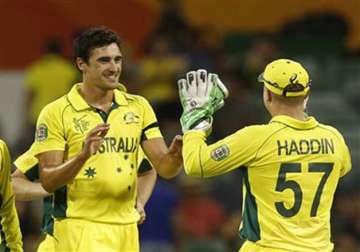World Cup 2015: Pacers will be the key in Australia vs Pakistan quarterfinal
Adelaide, Australia: The Australians have won the World Cup on every continent on the cricket map except their own. The honor of winning in Australia belongs to Pakistan, which recovered from a shaky start, had

Adelaide, Australia: The Australians have won the World Cup on every continent on the cricket map except their own. The honor of winning in Australia belongs to Pakistan, which recovered from a shaky start, had a little bit of luck along the way and then won the title for the first and only time in 1992.
The teams meet in a quarterfinal on Friday at the Adelaide Oval, the South Australian state capital where Pakistan will be playing for the third time this tournament.
There are some parallels with 1992 — the only other time Australia and New Zealand have co-hosted the tournament — in the way Pakistan, which beat England in the final, has progressed. Two early losses — including a defeat in Adelaide to defending champion India — put them on the brink of elimination before some momentum-boosting wins, particularly over South Africa.
Australia skipper Michael Clarke said his squad, which lost by one wicket in a low-scoring pool match to New Zealand in Auckland and finished second in Pool A, was always wary of a talented Pakistan lineup capable of beating any team when it peaks.
"I think Pakistan have been underrated for a long time, especially in the shorter form of the game," Clarke said. "I think they've got a lot of talent, and are well led. Pakistan have some really good quicks in their attack, and they've shown that throughout the series.
"I think fast bowling will play a big part, especially if I leave that grass on the wicket like there is now, fingers crossed."
Australia has banked on a bowling attack stacked with pacemen, and is very likely to go the same way on Friday with Mitchell Starc, who has a tournament-leading 16 wickets, and Mitch Johnson joined by either Pat Cummins or Josh Hazlewood.
Pakistan, due to injuries and unavailability, has had to rely mostly on pace backed up by leg-spinning allrounder Shahid Afridi. The balance of Pakistan's attack was unsettled again when fast bowler Mohammad Irfan was ruled out due to a fractured pelvis, but Clarke isn't getting carried away with Australia's seemingly overwhelming favoritism.
"It's irrelevant who is favorite now. You have to play your best cricket," he said. "We'll treat this like a World Cup final for us. It's a crucial game. Obviously, you lose, and you're sitting and watching the rest of the tournament, so we're focused on just making sure we can have success in this game."
Pakistan played its first and last pool games in Adelaide, and veteran skipper Misbah-ul-Haq said his lineup was comfortable in the conditions, confident it was gathering momentum and had no fear of the four-time champion Australians.
"Yeah, they are favorites, but there is no hard and fast rule that favorites are always going to win the game," Misbah said. "We've got a bowling lineup which can really go through any team, and a few batters just getting back into form.
"Australia always play aggressive cricket. And if you want to really go out there against them you also need good aggressive cricket ... you have still got a chance. It's not like that if you go with a defensive approach against Australia."
Misbah, who leads the Pakistan batsmen with 316 runs, including some important solo efforts early in the tournament, conceded the loss of Irfan was a setback, but not something that couldn't be overcome. Wahab Riaz has 14 wickets for the tournament, and Sohail Khan returned the best figures of 5-55 with a good, late burst against India.
"Obviously, everybody knows that he is a different kind of bowler, and that's a big loss for the team," Misbah said of Irfan. "But you have to just handle these things — we've got other bowlers who are good enough and they are also performing really well, they are up to the mark.
"We've still got that sort of team, that sort of talent, that sort of bowling lineup that could really put Australia under pressure."